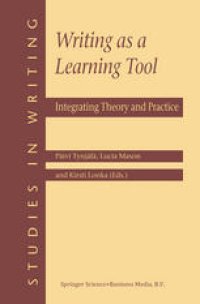
Ebook: Writing as a Learning Tool: Integrating Theory and Practice
- Tags: Learning & Instruction, Education (general), Cognitive Psychology, Applied Linguistics
- Series: Studies in Writing 7
- Year: 2001
- Publisher: Springer Netherlands
- Edition: 1
- Language: English
- pdf
In a brief summary, the debate concerning the nature of writing processes is about whether the essential characteristic of expertise in writing is a matter of mastering problem-solving strategies. In this respect, the role of social and interactive factors, such as writers' familiarity with the particular genre in which they are writing and their relationship with the discourse community in which they are participating, have been pointed out (e.g. Nystrand, 1989). According to the socio-interactive approach, which refers to Vygotsky's theory, the composition process is a dialogue between the writer and the reader made possible by socially shared knowledge. The meaning of a text is a social construct that is negotiated between the reader and the writer through the medium of the text. The importance of motivational aspects has also been highlighted by two main lines of research, studies of the relationship between writing and self-efficacy (e.g. Pajares & Johnson, 1994, 1996) and studies of the role of interest in the production of expository texts (e.g. Albin, Benton & Khramtsova, 1996; Benton, Corkill, Sharp, Downey, Khramtsova, 1995; Hidi & McLaren, 1990, 1991). Self-efficacy, in this context individuals' beliefs about their ability to produce certain types of texts, have been found to be predictive of writing skills, strategy use and writing performance.
This book is an outstanding account of the current state of using writing in service of learning. It presents psychological and educational foundations of the writing across the curriculum movement and describes writing-to-learn practices implemented at different levels of education, ranging from elementary school to higher education. It also puts the question into the broader context of schooling and society, including writing and modern technology. Writing as a Learning Tool provides concrete applications and ideas about how to enhance student learning by means of writing. It pictures writing being more than a mere skill. Writing is an act for making meaning and advancing thinking. This book provides inspiration and insight for everybody who wants to go beyond their current understanding of writing.